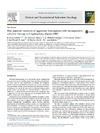Identificador persistente para citar o vincular este elemento:
https://accedacris.ulpgc.es/jspui/handle/10553/70012
| Campo DC | Valor | idioma |
|---|---|---|
| dc.contributor.author | Pinar Sedeño, B. | en_US |
| dc.contributor.author | Rodríguez Ibarria, N. | en_US |
| dc.contributor.author | Mhaidli Hamdani, H. | en_US |
| dc.contributor.author | Fernández Varela, T. | en_US |
| dc.contributor.author | San Miguel Arregui, I. | en_US |
| dc.contributor.author | Macías Verde, D. | en_US |
| dc.contributor.author | Lara Jiménez, P. C. | en_US |
| dc.date.accessioned | 2020-02-05T12:51:54Z | - |
| dc.date.accessioned | 2020-09-03T07:32:48Z | - |
| dc.date.available | 2020-02-05T12:51:54Z | - |
| dc.date.available | 2020-09-03T07:32:48Z | - |
| dc.date.issued | 2017 | en_US |
| dc.identifier.issn | 2405-6308 | en_US |
| dc.identifier.other | Scopus | - |
| dc.identifier.uri | https://accedacris.ulpgc.es/handle/10553/70012 | - |
| dc.description.abstract | Aggressive hemangiomas invade the spinal canal and/or paravertebral space and may cause cord compression and neurological symptoms. Radiation therapy was recognized as an effective strategy for the treatment of aggressive hemangiomas. Here, it is reported the first case of aggressive vertebral hemangioma treated by a combination of intraoperative radiation therapy and kyphoplasty (Kypho-IORT). | en_US |
| dc.language | eng | en_US |
| dc.relation.ispartof | Clinical and translational radiation oncology | en_US |
| dc.source | Clinical and Translational Radiation Oncology [ISSN 2405-6308], v. 2, p. 19-22 (Febrero 2017) | en_US |
| dc.subject | 320713 Oncología | en_US |
| dc.subject.other | Aggressive Vertebral Hemangioma | en_US |
| dc.subject.other | Intraoperative Radiation Therapy (Iort) | en_US |
| dc.subject.other | Kyphoplasty | en_US |
| dc.subject.other | IORT | en_US |
| dc.title | First reported treatment of aggressive hemangioma with intraoperative radiation therapy and kyphoplasty (Kypho-IORT) | en_US |
| dc.type | info:eu-repo/semantics/article | en_US |
| dc.type | Article | en_US |
| dc.identifier.doi | 10.1016/j.ctro.2016.12.008 | en_US |
| dc.identifier.scopus | 85071176976 | - |
| dc.identifier.isi | 000458473800004 | - |
| dc.contributor.authorscopusid | 57191693120 | - |
| dc.contributor.authorscopusid | 57191693289 | - |
| dc.contributor.authorscopusid | 57210740899 | - |
| dc.contributor.authorscopusid | 57210742007 | - |
| dc.contributor.authorscopusid | 57205357723 | - |
| dc.contributor.authorscopusid | 57210739641 | - |
| dc.contributor.authorscopusid | 6504824791 | - |
| dc.identifier.eissn | 2405-6308 | - |
| dc.description.lastpage | 22 | en_US |
| dc.description.firstpage | 19 | en_US |
| dc.relation.volume | 2 | en_US |
| dc.investigacion | Ciencias de la Salud | en_US |
| dc.type2 | Artículo | en_US |
| dc.contributor.daisngid | 17706867 | - |
| dc.contributor.daisngid | 16497579 | - |
| dc.contributor.daisngid | 29670364 | - |
| dc.contributor.daisngid | 9006903 | - |
| dc.contributor.daisngid | 22033771 | - |
| dc.contributor.daisngid | 25125954 | - |
| dc.contributor.daisngid | 4129545 | - |
| dc.description.numberofpages | 4 | en_US |
| dc.utils.revision | Sí | en_US |
| dc.contributor.wosstandard | WOS:Sedeno, BP | - |
| dc.contributor.wosstandard | WOS:Ibarria, NR | - |
| dc.contributor.wosstandard | WOS:Hamdani, HM | - |
| dc.contributor.wosstandard | WOS:Varela, TF | - |
| dc.contributor.wosstandard | WOS:Arregui, IS | - |
| dc.contributor.wosstandard | WOS:Verde, DM | - |
| dc.contributor.wosstandard | WOS:Jimenez, PCL | - |
| dc.date.coverdate | Febrero 2017 | en_US |
| dc.identifier.ulpgc | Sí | es |
| item.fulltext | Con texto completo | - |
| item.grantfulltext | open | - |
| Colección: | Artículos | |
Citas SCOPUSTM
8
actualizado el 08-jun-2025
Citas de WEB OF SCIENCETM
Citations
3
actualizado el 01-feb-2026
Visitas
70
actualizado el 10-ene-2026
Descargas
62
actualizado el 10-ene-2026
Google ScholarTM
Verifica
Altmetric
Comparte
Exporta metadatos
Los elementos en ULPGC accedaCRIS están protegidos por derechos de autor con todos los derechos reservados, a menos que se indique lo contrario.
